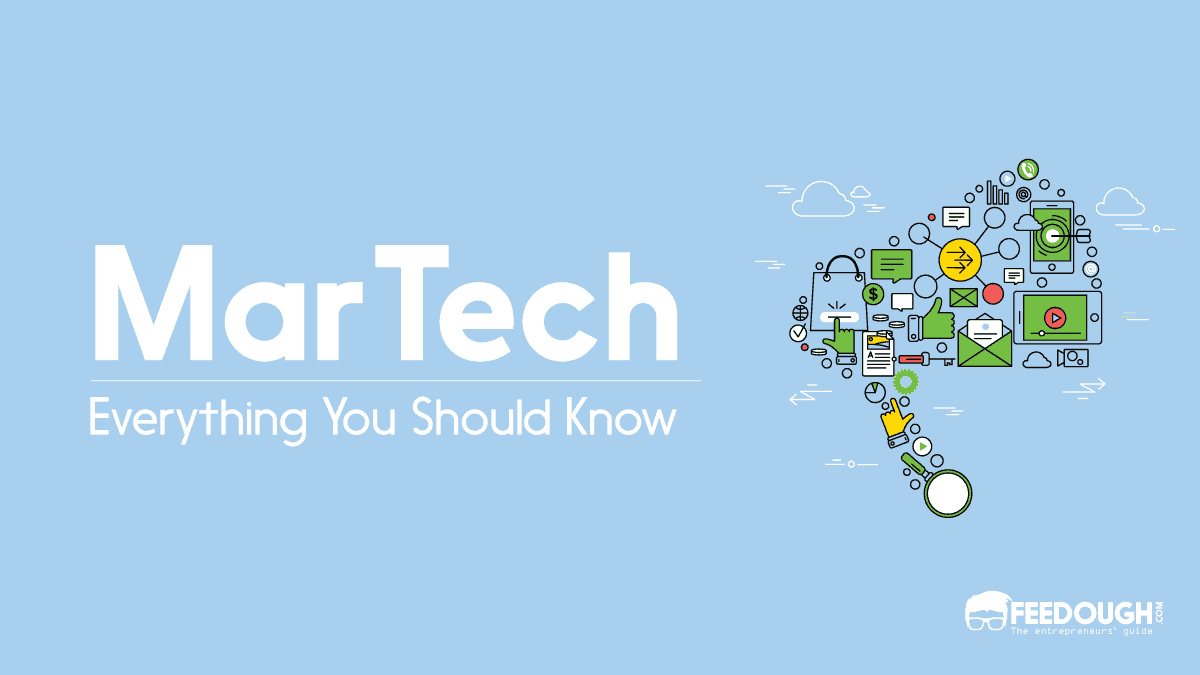Technology powers almost every aspect of marketing today – from product development to refining target audience, to executing promotional strategies; marketing without technology today is a lame horse in the horse race.
The advent of the internet has drastically affected the customer buying journey, and the customers have become more demanding now – asking for more personalisations, options, and distribution channels.
To meet these needs, modern marketers came up with numerous technology-powered marketing tools, collectively known as martech.
What Is MarTech?
Marketing technology or martech refers to using technology and tools to plan and execute marketing strategies that assist in achieving marketing objectives.
Often confused to be limited to digital marketing campaigns, martech today powers every aspect of modern marketing by helping marketers plan, create, execute, and automate their efforts, reducing the number of person-hours required to execute the marketing strategy.
Martech intends to complement all aspects of marketing –
- Product: Martech helps users forecast demand and conduct trend analysis to map a buyer persona and customer journey. The business uses all this to develop its products to be sold in the market.
- Price: Marketers need assistance to set the right price of products for the right customers. Martech helps in the process by considering all the factors like the needs and wants of the customers and helps find the best price.
- Place: It helps businesses choose the right channel of distribution to maximise operational efficiency. It automates the flow of information between marketing departments, managing inventory levels, warehouses, and other logistics. The distribution structure is digitised to streamline all sales processes.
- Promotion: Modern technology helps businesses gather insights into customers to create and circulate effective ads to market their products better. This attracts the customers and allows them give a more personalised experience.
Often, the marketing team uses a set of different marketing technology tools to assist them in overcoming marketing challenges and fulfilling their tasks. This set is referred to as the marketing technology stack.
Challenges to Marketing
Marketing is an uphill struggle that starts way before product development and often never ends. It comes with its own set of challenges that marketers have to overcome to offer a saleable product that makes profits. These are:
- Product Development: The biggest challenge a marketer faces is identifying the needs, wants, and desires of the target customer and predicting the best saleable solution for the same.
- Data Collection, Management, and Analysis: Today, every marketing step, be it big or small, revolves around data. Marketers identify industry trends, customer needs, product requirements, growth projections, SWOT, etc., using data analytics. However, collecting, managing, and analysing such massive data proves to be a challenge for marketers.
- Branding: Developing a brand in the competitive market is a marketing task that often poses a challenge to marketers. Often marketers fail to identify the perfect brand positioning that aligns with the market demand. Another challenge that marketers face is to align their brand image with the brand identity.
- Promotion: Marketers wish to choose the best promotional strategy to put in motion, but with so many variables in consideration, it is difficult to predict the outcome and effectiveness of a strategy. Moreover, personalised promotion poses a challenge for marketers.
- Relationship Management: Traditional marketing strategies often limit marketers in maintaining relationships with all the customers as it requires data management and one-to-one relationships, that require more workforce.
- Efficient Management Of Resources: One of the biggest marketing challenges is to manage limited resources better and direct them to a fruitful outcome. Traditionally, marketers used the trial and error method to find the perfect solution to a problem, but the process itself requires substantial resources.
- Sales: Even if a target market is well built, pushing the customers through the marketing funnel is a challenge. From lead generation, where the customer becomes aware of the offering until the actual purchase, marketers play an integral role.
- ROI Optimisation: Finding the best performing marketing, sales, and distribution channels require data analysis and management. Marketers often struggle to find the perfect balance of strategies that result in the most return on investment.
- Brand Experience: Maintaining a holistic identity around all the customer touchpoints and developing a brand experience across numerous online and offline channels pose a big channel for the marketing team.
MarTech Use Cases
A combination of digital tools that marketers use to make marketing campaigns and strategies more effective is a martech stack.
The martech stack makes several marketing challenges easier to handle by making difficult marketing processes simple. Its use-cases include:
Data And Analytics Solutions
Marketers have a way to collect statistical data, interpret it and validate it for further trend and demand analysis. Today, technology-powered software takes several attributes into account to generate results and trends, which helps marketers to analyse buyer behaviour. They also provide a quantifiable measure of the effectiveness of marketing campaigns and messages. Software like Google Analytics, Oribi, etc., makes it easier to collect website and application data and execute marketing strategies. One can even use tools like Authentiq, ConsentEye, etc. to better make legal data compliance.
Advertising And Promotion
Martech has made microtargeting and personalisation possible. Advertisers today can use platforms and tools like Google Adwords, Facebook Pixel, etc. to power their advertisements using data and target the same to the most relevant users – the users who have visited their website, has certain interests, or buy products from their competitors, etc.
Several other advertising tools find their place in the martech stack. They include display and programmatic advertising tools like SmartyAds to video advertising platforms like Vidsy.co, to even PR tools like PRMax.
Commerce And Sales
Sales automation includes the automation of all the processes from lead acquisition to conversion. Martech tools enable the easy flow of information among sales, marketing, distribution, and logistics throughout the supply chain.
Streamlining all these administrative tasks improves operational efficiency and flexibility. Inventory levels can be controlled to balance with customer demand.
Sales-oriented martech tools drive lead generation, automate sales processes, and improve customer experience to help convert leads to customers.
Content And Experience
With a marketing stack, developing a holistic experience for the customers is easy. Marketers use mobile application builders like Appypie, video marketing tools like invideo, email marketing platforms like MooSend, and content marketing tools like BuzzSumo to develop holistic marketing campaigns.
Today, Content Management System (CMS) helps marketers build a website to manage the web presence without any specialised technical knowledge. The marketers also make use of both pull and push marketing strategies using search engine optimisation (SEO), search engine marketing (SEM), and social media marketing (SMM) to increase the visibility of websites on search engine result pages.
Customer Relationships
Customer relationship management is a set of strategies and practices which manage the company’s relationships and interactions with customers throughout the customer lifecycle. These strategies include reminders, contact and task management, and a record of reports. Martech stack like Hubspot, Salesforce, etc., makes it easy for marketers to maintain such records and build valuable relationships with customers and prospects.
Moreover, such tools also help automate repetitive tasks such as email and mobile marketing, social media posts and ad campaigns. It increases efficiency and also provides a personalised experience to customers – emails and messages are automatically triggered based on particular choices of the customers – reducing the workforce and cost.
Marketo is a SaaS-based platform that helps marketers automate and measure marketing engagement, tasks, and workflows.
Social and relationships
With the advent of the internet and social media, social media marketing has become an important marketing channel. Social and relationship tools help make social tasks like SMM, event management, meetings, webinars, advocacy, influencer marketing, community management, etc., easier.
SMM tools like Buffer enable marketers to manage their online presence by creating and scheduling posts across various social media platforms, monitoring conversations and trends, and doing collaborations. The main aim is to engage with the audience and attract their attention.
Event management tools like GoToWebinar makes creating and managing webinars, meetings, and video calls easier. Moreover, some bots make handling social relationships smoother.
Management
Martech stack also provides internal talent management, collaborations, and product management solutions. Tools like Marvel, Notion, etc., make it easy for teams to connect with other members and manage projects better.
Popular Martech Companies
Martech is one industry with a daily influx of innovation and new tools. Here are some examples of top martech tools that are important to marketers’ lives today.
- Hootsuite: It is a social media marketing tool that helps users manage social media channels and launch marketing campaigns. It provides a dashboard from which the users can schedule posts across all the social media platforms and simultaneously measure ROI.
- Salesforce: It is the biggest Customer relationship management (CRM) software in the market. It offers a system ‘lead to conversion’ approach that integrates contact management, collaboration tools, customer engagement and task management, and the data collected. All the departments of a business are offered to view the same customer from different aspects.
- GetResponse: It is a marketing tool that helps businesses build and maintain contacts and coordinate marketing campaigns. Though it is mainly an email marketing software, it allows the user to create landing pages, webinars, surveys, and publish newsletters. It has a user-friendly database that allows the user to create campaigns and manage mailing lists within the software.
- ContentGrow: It helps marketers overcome one of the biggest challenges to marketing – content creation. Companies that wish to outsource their work of creating content can list them on their website. They select freelancers who suit the profile and budget requirements of the company and help in the process.
- Google Analytics: It is the most popular web analytics tool used to collect information from websites and track web activity. The elements of the information collected include session duration, pages per session, website performance, and other visitor insights. It provides statistics and basic tools for marketing and SEO.
Impact Of Technology On Marketing
The introduction of technology in marketing has completely transformed marketing campaigns. Companies focus on making them more personalised and immersive to provide a better customer experience.
Improves Efficiency
The introduction of technology in marketing leads to the automation of many laborious tasks. This causes a reduction in costs and person-hours required to execute the marketing strategy. Marketers have more time to strategise and invest it in forming a combination of company-suited marketing tools.
Actionable Insight Into ROI
Attributes like higher ranking in SERPs, clicks, or page views per order placed give marketers an estimate of how the ROI will turn out.
A strong connection is established between marketing activities, campaign investments, and sales results. It gives a close to the actual figure of leads and customers generated through marketing, if not completely accurate.
Rise In Purpose-Driven Marketing
Nowadays, customers no longer want to remain on a buyer-seller basis. They wish to build brand relationships by establishing trust and belief in the company values. This constitutes purpose-driven marketing.
Now, technology allows the marketer to analyse elements that matter to the customers and make sure they align with the brand offerings, which further acts a catalyst to build trust.
Improved Customer Experience
The internet has allowed customers to explore and learn about the product and services they wish to buy before even going into a shop or contacting a salesperson.
Content marketing plays a huge role in this process, and with the help of associated tools, marketers aim to deliver a personalised customer experience.
Easy Collection And Organisation Of Data
Marketers can now operate using vast quantities of data at their fingertips stored in electronic form. This enables a hassle-free analysis and provides deeper insights to marketers about their target audiences. This saves the marketers from skimming through raw data and wasting their time on it.
Increased Budget Allocation To Grow Revenue
Integration of technology with business operations requires a huge commitment in terms of finance which concerns marketers. The amount of investment depends on the type of technology used – some require high-level implementation while some have minimal integration. Either way, it gets justified later as the revenue amount outnumbers the amount used for investment.
Based on previous years’ results, budget allocations towards marketing are increased, thus boosting revenue.
Future Of Martech
Once the technology is introduced in marketing, there is no going back. As businesses shift from traditional methods to modern methods, they are increasingly inclined towards technological advancements.
New startups will emerge in the future, probably introducing even more martech tools for assisting marketing campaigns.
More and more businesses are moving forward by investing in marketing technology to build their stacks and foster the company’s growth.
Go On, Tell Us What You Think!
Did we miss something? Come on! Tell us what you think about our article on marketing technology in the comments section.
A startup enthusiast, optimist and full time learner. With keen interest in finance and management, Khushi believes communication to be the key to every management. Always ready to explore more and walking that extra mile in putting efforts.










![AI Product Description Generator [Unlimited & No Login] Product Description Generator](https://www.feedough.com/wp-content/uploads/2023/12/Cover-images-150x150.webp)



